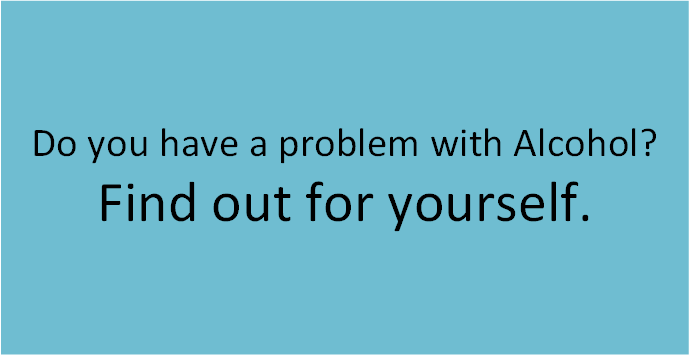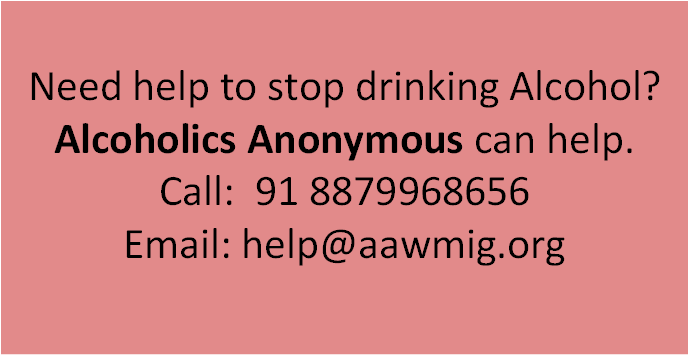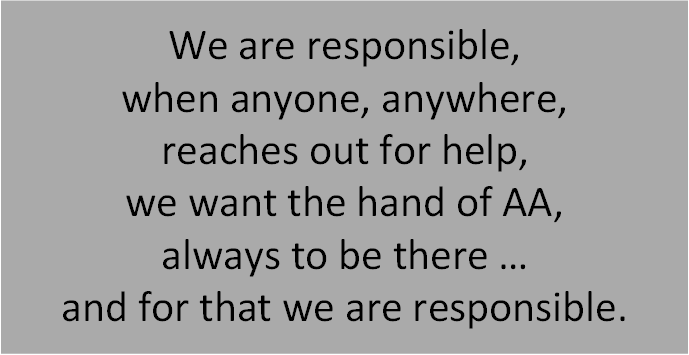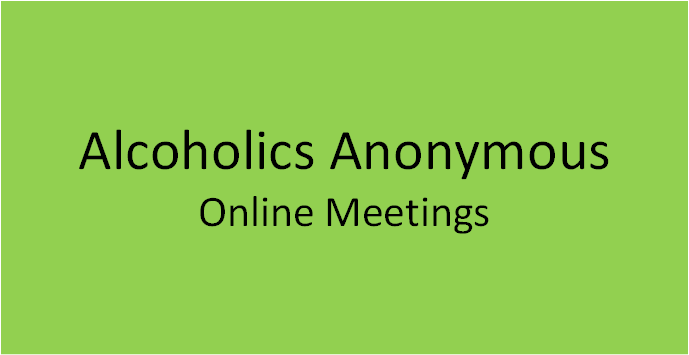“Practical experience shows that nothing wlll so much insure immunity from drinking as intensive work with other alcoholics.”
This opening sentence, of the chapter “Working With Others” in the Big Book, is further emphasized in Twelve Steps and Twelve Traditions (p. 106): “The joy of living is the theme of A.A.’s Twelfih Step, and action is its key word. Here we turn outward toward our fellow alcoholics who are still in distress. Here we experience the kind of giving that asks no rewards . . . the kind of love that has no price tag on it.”
How well is our Fellowship doing with this vital practice, since the time, over 55 years ago, when cofounders Bill W. and Dr. Bob first put this most basic principle of A.A. into action? Is your home group geared toward our primary purpose – to carry the message to the alcoholic who still suffers? Are today’s A.A. sponsors passing on to newcomers what A.A. is really all about? Are we living up to our responsibility to share our experience, strength and hope of recovery in the A.A. program”? Or are we diluting the simple and powerful A.A. message with other non-A.A. phllosophies and ideas, suggestions and advice that are, though perhaps well-intentioned, actually misguided and even harmful?
Recognizing the need for renewed emphasis on this basic tenet, the 1990 General Service Conference set the theme for the 1991 Conference as “Sponsorship: Gral’itude in Action.” The Conference delegates seemed to recognize that their ability to serve A.A. in the U.S. and Canada was defined by their experiences in bemg sponsored into recovery, and their continued willingness to share with another alcoholic specifically what they had received through A.A. membership and the practice of om Twelve Steps.
During a Dtstrict 6 Sponsorship workshop in Kansas, past trustee-at-large/U.S., David A., asked what do we have to offer when a new person, wet or dry, calls A.A., or comes to an A.A. meeting: “Only one thing; how an alcoholic can recover in Alcoholics Anonymous. We share our experiences before A.A. and how we achieved and mamtain sobriety through working the Twelve Steps of recovery with a sponsor, and how we continue to apply those principles to daily living.”
David suggested that all A.A. experience is contained in our literature, and emphasized the value of our pamphlet «Questions and Answers on Sponsorship” as a basic guide. He also pointed out the story of our third member, “A.A. Number Three” (Alcoholics Anonymous, p. 182) as an excellent outline on Twelfth Step work. carrying our message in such a way may be the beginning of an opportunity to serve as a sponsor.
A.A. members who agree understand that they are not responsible for anyone else’s sobriety; only for being willing to shore their experience with A.A.’s program and Steps of recovery regardless of circumstances or situations. Each one of us involved in sharing in this way recognizes that ow· fitness to honestly convey the heart of our A.A. recovery is based on our individual, daily spiritual progress.
“Sponsorship-being one and having oue- is a necessary part ofmyprogram,” says David W., ofBella Vista, Arkansas, who, W1th several others some years ago, was responsible for setting up the first Bridge-the Gap (temporaty A.A. contact) program in Oklahoma, a program that has now spread to other parts of the country. “I feel very strongly there isn’t enough follow-up when new A.A.s are released from treatment facilities,” says David. “The facilities tend to appoint temporary sponsors, which I’ve never approved of. Why? Because it’s much better for the newcomer to pick hi:; own sponsor, it’s part of growing up.”
“I don’t believe newcomers these days are given a chance to hear enough of what A.A. is,” David continues. “The sponsor’s role is not that of a marr1age counselor or a banker or therapist. If sponsors take on these extra roles, they do more harm than good, by making newcomers too dependent on them and not enough on a Higher Power.”
“All I share is my actual experience,” says Raymond D., of Santa Cruz, Califomia. “I don’t believe in tutorial sponsorship, a teacher-student type of relationship. We’re equals.” The heart of what Raymond shares is “the importance of working the Steps, a nd how I gradually moved from atheism to believing in a Higher Power.” Raymond agrees that each of us is better off choosing our own sponsors; ” they pick me intuitlvely when they’ve heard me share- and that choice has a spiritual significance.”
A.A. groups composed of members who are actively engaged in sponsorship tend to have a warm, open atmosphere for newcomers and traveling A.A.s who want, or need, a meeting. That kind of group is a good source of practical experience for those beginning the habit of sponsorship to draw on. David A. talked about sponsors growing up in these groups when he said, “They have more to offer newcomers than the Twelve Steps, Twelve Traditions, Twelve Concepts of World Service and the Third Legacy. They are the very life of ow Fellowship and the basis of our future.”
These same groups often are willing to help new groups get underway by carrying A.A. in until the newest get strong enough to continue on their own. When asked, local A.A.s will often respond to difficulties being expenenced by an established group by sharing their experience and how they practice our Traditions to insure group unity and the survival of A.A.
Some A.A. members share their participation in general service with those they sponsor. We often hear a D.C.M. or area delegate say their sponsor took them to their first service assembly. Many A.A. members learned the importance of our central offices when their sponsors suggested they volunteer to answer phones at the local A.A. office or intergroup. And, at the biennial World Service Meetings, new countries invariably demonstrate the sharing brought to them by members from other countries through sponsorship, country to country.
Bill W. wrote on several occasions of the profound effect that his friend Ebby (whom he always called his sponsor) had on him when Bill was barely sober, lying in a hospital bed. Ebby told Bill he had to «admit you’re licked; … get honest with yourself; . .. talk it out with somebody else; … make restitution to the people you have harmed; .. . give of yourself without stint; … and pray to whatever God you think there is .” In a nutshell, Ebby handed Bill the germ of what we now call A.A.’s Twelve Step program. It is what we, as sponsors, have the responsibility to share with newcomers. When those early members went out to carry the message, Bill tells us over and over, all they were sharing was their own experience, and they were doing it to insure their own sobriety. Their onl;v expertise was their past drunken lives and their experiences in sobriety.
Bill’s words on sponsorship offer a promise for each of us and for our Fellowship: “Showing others who suffer how we were given help is the ve1y thmg which makes life seem so worth while to us now. Cling to the thought that, in God’s hands, the dark past is the greatest possession you have-the key to life and happiness for others. With it you can avert death and misery for them.” (Alcoholics Anonymous, p. 124)
As published in
News and Notes from the General Service Office of A.A. ® Box 459 Vol. 37, No.2 /April-May 1991 www.aa.org



